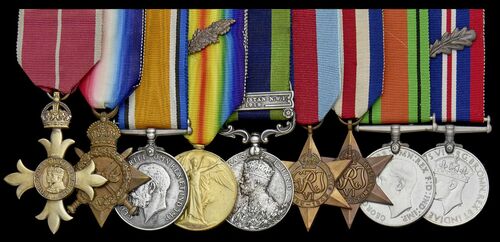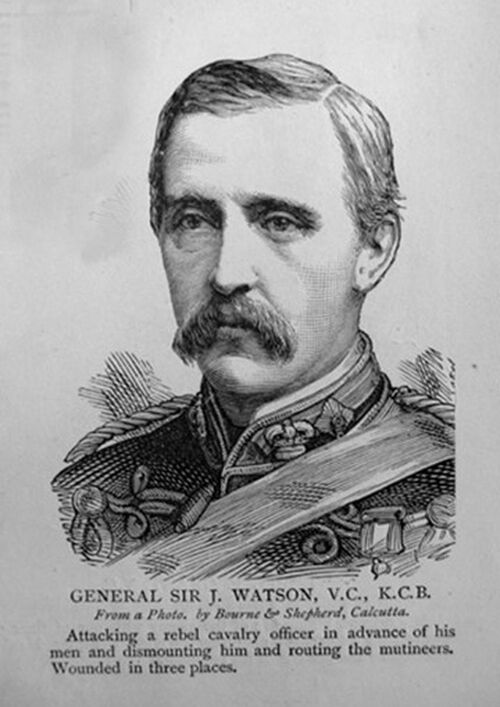Auction: 24002 - Orders, Decorations and Medals
Lot: 197
A Second World War O.B.E. group of nine to Lieutenant-Colonel R. A. D. Watson, Royal Engineers, decorated for Bomb Disposal at Wimereux in 1940, he was additionally thrice 'mentioned' and survived the Quetta Earthquake
The Most Excellent Order of the British Empire, O.B.E. (Military Division) 2nd Type, Officer's breast Badge, silver-gilt; 1914-15 Star (2. Lieut. R. A. D. Watson. R.E.); British War and Victory Medals, with M.I.D. oak leaves (Capt. R. A. D. Watson); India General Service 1908-35, 1 clasp, Afghanistan N.W.F. 1919 (Capt. R. A. D. Watson, R.E.); 1939-1945 Star; France and Germany Star; Defence War Medals, with M.I.D. oak leaf, very fine (9)
O.B.E. London Gazette 3 September 1940:
'For gallantry and devotion to duty in the field. When four 500lb aerial bombs fell at Wimereux and failed to explode, this officer organised and personally supervised the location, removal and destruction of these bombs, although he knew that it was possible that they were fitted with delay action fuses. Had these bombs been left to detonate, great damage would have been caused to valuable stores and equipment in the neighbourhood.'
M.I.D. London Gazette 14 June 1918, 26 July 1940 & 10 May 1945.
Robert Arthur Davis Watson was born on 23 June 1896 at Dalhousie, India the only son of Major-General Sir Harry Davis Watson, K.B.E., C.B., C.M.G., C.I.E., M.V.O. (1866-1945). Watson's grandfather, Maj. Gen.Sir Harry's father, was General Sir John Watson V.C., G.C.B., (1829-1919) who served with the Bengal Army and received his Victoria Cross for actions at Lucknow during the Indian Mutiny.
Young Watson was educated at Wellington College, Berkshire, between September 1909-December 1913; West Wratting School, Cambridgeshire in January 1914, whereupon he became an Officer Cadet at the Royal Military Academy, Woolwich in February 1914 and received further specialised education at the School of Military Engineering at Chatham. He was commissioned 2nd Lieutenant into the Royal Engineers on 10 February 1915 and went to France on 28 August 1915. He was first posted to the 84th Field Company, on 9 September then the 83rd Field Company on 30 January 1916. Watson would see action during the Battle of Loos and in the Ypres sector during 1916. He was admitted to hospital on 5 May 1916 with concussion and arrived hospital in England on 15 May.
He was promoted to Lieutenant on 23 July 1916. He did not return to France but was posted to the Royal Engineers Depot at Aldershot on 20 December 1916. On 16 March 1917, Watson embarked for the Middle East from Southampton on the Kalyan, arriving in Alexandria, via Marseilles, on 31 March. He joined a Field Squadron of the Imperial Mounted Division in April at El Arish, under the Assistant Director of Works on the Lines of Communication. Watson was posted to 7th Field Troop on 29 April 1917 and transferred to the 6th Field Squadron, Yeomanry Mounted Division on 6 July 1917.
In January 1918, he transferred to the H.Q. Force, appointed an A.D.C. to the General Officer Commanding the Egyptian Expd. Force, which appears to have been arranged by his father, Major-General Sir Harry Davis Watson, K.B.E., C.B., C.M.G., C.I.E., M.V.O., commanding the 20th Indian Brigade. He served in this capacity between 16 January-13 March 1918.
On 14 March 1918, he was returned to his previous unit, the 7th Field Troop. He was promoted Captain on 27 March 1918 and on 13 June, he was admitted to the 66th Casualty Clearing Station suffering with an ulcerated arm. Watson was 'mentioned' by General Allenby for services with the Egyptian Expeditionary Force. On 23 July, although still in hospital Watson received news he was to join the Indian Army - once again, the posting influenced by his father, who was G.O.C Gurkhas in India.
He proceeded to India on 8 August 1918, on board the Mutlah, arriving on 20 August. He joined the 56th Field Company, 1st Sappers and Miners on 1 September 1918. On 6 May 1919, he was promoted to Acting Major whilst commanding the same Field Company of the 1st Sappers and Miners on the North West Frontier (Medal & clasp). He retained his command of the 56th Field Company in Roorkee, taking them to Egypt on 3 March 1920. He became the Acting Commandant Royal Engineers of the 3rd Lahore Division between 12 June-2 August 1920, whereupon he resumed his command of the 56th Field Company.
He returned to the for a course at Chatham on 20 August 1920 and was then posted to a Training Battalion as O.C. 'A' Company, School of Military Engineering at Chatham. Watson married Ethel Douglas Lace, on 1 September 1920 at the Holy Trinity Parish Church, Drewsteignton, Devon. Their first son, Robert Hugh Davis Watson was born in 1923.
Watson joined the 43rd (Wessex) Divisional Engineers on 13 January 1926 at Bath and was appointed its Adjutant on 20 January; a post he retained until 23 January 1930. Watson was promoted Major on 9 August, 1930. He returned to Chatham on 15 April 1930, where he embarked upon an Electrical and Mechanical Course and on 16 May 1932, whilst on the strength of the Eastern Command, re-wrote the Water Supply Manual.
He returned to India on 28 February 1933 and took up the post of Garrison Engineer at Balin, Rajasthan on 26 March. On 31 December 1933, he was appointed Officiating Staff Officer, R.E. 2nd Grade (Electrical and Mechanical) at Quetta.
A devastating earthquake occurred on 31 May 1935 at Quetta, Balochistan, British India (now part of Pakistan), close to the border with southern Afghanistan. The earthquake had a magnitude of 7.7 and anywhere between 30,000-60,000 people died from the impact. It was recorded as the deadliest earthquake to strike South Asia until 2005. The quake was centred 4 km south-west of Ali Jaan, Balochistan, British India. It would appear that Watson, were posted to that region at the time, for Ethel was awarded the Bronze Kaisar-i-Hind for her services in the aftermath of the earthquake.
On 1 December, 1937, he joined the Southern Command at Warminster as Deputy Commandant, and was promoted Lieutenant-Colonel on 24 September 1938, whilst serving at Tidworth and posted to Larkhill. On 8 January 1939, Watson attended a one week Anti-Gas Course at the School of Mechanical Engineering.
On the outbreak of the Second World War, Watson was mobilised at Aldershot and appointed Deputy Assistant Director of Works, (Electrical and Mechanical) for the British Expeditionary Force on 2 September 1939, arriving in France on 10 September - the first wave of British troops to be landed at Cherbourg. On 5 December, Watson was appointed Commanding Royal Engineer of the GHQ, 2nd Echelon.
It was during the period he was attached to the British Expeditionary Force in France, that he was singled out for distinction in pursuance of his duties in rendering enemy bombs ineffective. Following his actions, he was recommended for a D.S.O. by his commanding officer, Brigadier J. A. D. Griffin, at Boulogne, but awarded the O.B.E. for Gallantry instead. Once again 'mentioned', returned from France on 18 June 1940, taking up the position of C.R.E. Corsham District, based in Salisbury.
Watson was made Acting Colonel and Commanding Engineer, Eastern Command between 11 November-20 December 1940, reverting to his former rank on 4 February 1941. He had two periods in hospital, cause unknown, between 27 December 1940-6 January 1941 and again from 26 January-4 February 1941. Watson then had a series of home postings as C.R.E. of various districts.
On 28 July 1943, he commanded No. 5 Commando Troop Engineers, which in November, was converted to No. 5 Lines of Communication Troop Engineers in November 1943. On 9 January 1944, his first son, Robert Hugh Davis Watson, was killed in a training mission.
On 13 March 1944, Watson was appointed C.R.E. of 153 Company. He accompanied the D-Day Invasion Force, landing in France D-Day +6, on 12 June 1944, serving with it until 14 August, when he returned home, then joined the Force again in North West Europe, on 26 September, likely linked to Operation Market Garden. Once again, Watson distinguished himself and was 'mentioned'. Returning home from B.A.O.R., via Brussels on 9 August 1945, he was initially attached to Western Command, before becoming C.R.E. at Warwick on 1 January 1946.
It would appear that either his wife had died or they had divorced, for local newspapers in December 1945, record that Watson had committed adultery with Lucia Jean Rinn at his home of 11 Chestnut Walk, Stratford and was cited in divorce proceedings by Lucia's husband. In fact, at some point, Watson married Lucia after this incident.
On 2 April 1946, Watson arrived in Manipur, India and was taken on the strength of India Command and posted to Delhi, where he became Staff Officer, R.E. Grade 1 in the Eastern Command. He returned home on 5 February 1947 and retired on 16 May 1947. He took up residence at 26 Avon Crescent, Stratford upon Avon, with his wife Lucia. Sadly, Watson was not to have a long and full retirement. On 22 June 1949, he took a considerable accidental fall at his house and was admitted to hospital, where he died on 2 July 1949.
Subject to 20% VAT on Buyer’s Premium. For more information please view Terms and Conditions for Buyers.
Sold for
£1,100
Starting price
£1000







